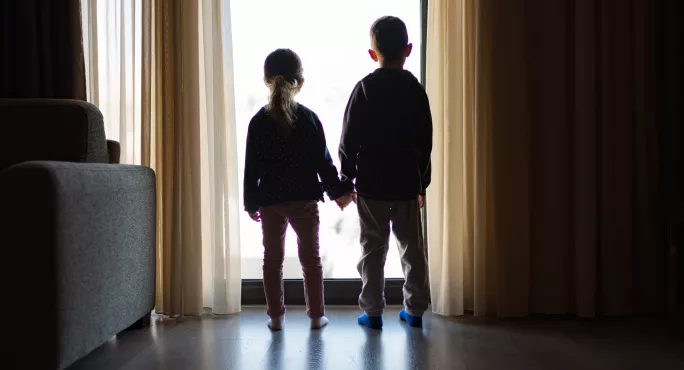
6 ways Covid has hit poorer pupils the hardest

As finance minister Kate Forbes delivered today, a number of documents were published - including one that lays bare the impact of the Covid-19 pandemic on pupils from the poorest backgrounds.
°Őłó±đÌęÌęincludes analysis of how Covid has, in a number of ways, done most damage to the lives of certain children and young people:
1. Attainment
While it was already clear before Covid that âgaps in educational attainment persist throughout the school years and beyondâ, pupilsâÌęâlearning experiences changed dramatically during the pandemic, and developing evidence suggest [sic] that the impacts of this have been greater for already disadvantaged groupsâ.
Scottish Budget 2021:ÌęReal-terms pay freeze lets down teachers, says union
Equity audit:ÌęPupils in P1 and S1 among worst hit by Covid lockdown
Review of remote learning: What you need to know
The first lockdown:ÌęWhat wasÌęlife really like for pupils in lockdown?
Attainment gap: Why closing it is about more than school
2.ÌęPoverty
The report highlightsÌęemerging evidence which suggests that âchildcare and school building closures during the Covid-19 pandemic have affected children from low-income families and children in vulnerable situations more severely than othersâ.
It adds: âKey areas of concern for low-income families included increasing levels of poverty, food insecurity, utility payments and fuel poverty, digital divide issues, and family and child wellbeing.â
3. Home learning
Pupils from poorer backgrounds have been âmore likelyâÌęto have âa less positive experience of remote learningâÌęwhile unable to attend school buildings. There have been âconsiderable differencesâÌęin âaccess to resources to support home learning - such as electronic devices, internet access, a quiet space to study and parental guidanceâ. And there have been âadditional barriers to home learning where English is an additional language or where children have additional needsâ.
4. Employment and training
The report states: âAs a result of Covid-19 restrictions, young people who are students have had their skills, learning and development disrupted, which poses challenges for attainment, career progressionÌęand longer-term participation in education, employment or training.
âMany sectors that are active employers of apprentices were necessarily placed into lockdown and are now experiencing the consequences of these measures. Recruitment decisions were paused or stopped altogether while restrictions on workplaces and the remained in place.â
As one example, as of November 2020, the number of modern apprenticeship (MA) starts was 3,633 -Ìęa decrease of 10,086 from November 2019, when the number of MA starts was 13,719. Previously, numbers had been increasing since 2014.
5. Mental health
The report finds âemerging evidence that interventions, such as social distancing, stay-at-home guidance and school closures, have likely had an adverse effect on the mental health and wellbeing of children and young people - although some have reported benefits for their mental healthâ.
It adds: âVulnerable children and young people, and those with challenging home environments, are more likely than others to have had experiences during the pandemic that are associated with a risk to mental health and wellbeing, such as disruptions to support. Girls, particularly older girls, and young people from disadvantaged backgrounds have worse mental wellbeing outcomes.â
6. Domestic abuse
The report states: âServices received reports of children being exposed to increased levels of domestic abuse consistent with the period of lockdown. This was due to prolonged contact with perpetrators when children were not returned to the non-abusive parent after contact; perpetratorsâ drug and alcohol abuse in the presence of children; and the impact of the perpetratorâs psychological abuse and monitoring behaviours on the non-abusive parent and their parenting capacity.â
It adds that âmany services reported that, because children did not have access to safe spaces or other trusted adults, there were fewer opportunities for them to report and receive supportâ.
The report also notes that,Ìęafter children returned to school, specialistÌęservices âexperienced significant challenges in negotiating access to school buildings due to the coronavirus restrictionsâ.
You need a Tes subscription to read this article
Subscribe now to read this article and get other subscriber-only content:
- Unlimited access to all Tes magazine content
- Exclusive subscriber-only stories
- Award-winning email newsletters
- Unlimited access to all Tes magazine content
- Exclusive subscriber-only stories
- Award-winning email newsletters
You need a subscription to read this article
Subscribe now to read this article and get other subscriber-only content, including:
- Unlimited access to all Tes magazine content
- Exclusive subscriber-only stories
- Award-winning email newsletters
- Unlimited access to all Tes magazine content
- Exclusive subscriber-only stories
- Award-winning email newsletters